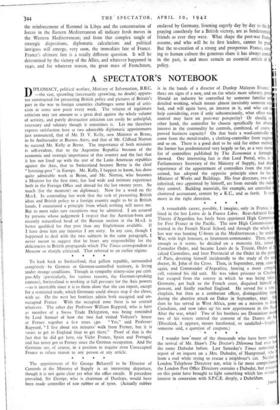The appointment of Sir George Beharrell to be Director of
Controls at the Ministry of Supply is an interesting departure, though it is not quite clear yet what the office entails. If precedent prevailed, Sir George, who is chairman of Dunlops, would have been made controller of raw rubber or of tyres. (Actually rubber is in the hands of a director of Dunlop Malayan Estates.) there are signs of a new, and on the who:e more salutary, pr Should an industry be controlled by someone familiar wt detailed working, which means almost inevitably someone uh had, and will again have, an interest in it, and who can help considering, even if only subconsciously, what effect wa control may have on post-war prosperity? Or should, on other band, the controller be chosen specifically for absen interest in the commodity he controls, combined, of course, proved business capacity? On that basis a wool-controller come from the metal-trades, a clothing-controller from engin and so on. There is a good deal to be said for either method, the former has predominated very largely so far, as a very inst
list of controllers published by The Economist a fortnight showed. One interesting fact is that Lord Portal, who, as Parliamentary Secretary of the Ministry of Supply, had ab experience of the appointment of controllers from the trade cemed, has adopted the opposite principle since he has Minister of Works and Buildings. His four directors, two of
inherited, two appointed by himself, are from outside the indu they control. Building materials, for example, are controlled chartered accountant, cement by a K.C., and so forth. It Sc move in the right direction.


























 Previous page
Previous page